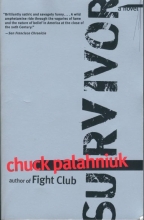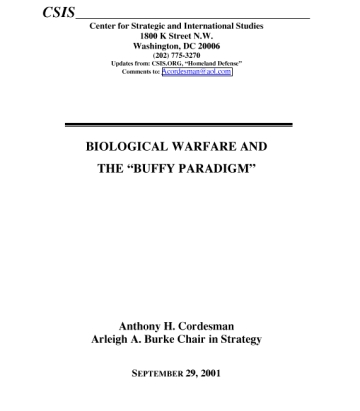|
|
|
Chuck Palahniuk Wants to Write Horror
The Agony Column for September 30, 2002
Commentary by Rick Kleffel
Chuck Palahniuk has plans for at least two more horror
novels.

|
|
|
The Agony Column for September 30, 2002
Commentary by Rick Kleffel
Chuck Palahniuk has plans for at least two more horror
novels.

That's what he told me. In the interview I conducted for KUSP, he laid out his plans for at least two more horror novels beyond his current release 'Lullaby'. In the last column, I talked about Palahniuk as one of the reasons that horror isn't dead (again!? -- not again!). Having just finished 'Survivor', I'm of a mind to think that he's already written in the genre and done a fine job. What is it about genre that attracts our finest writers? Why would creative artists want to constrain themselves, to put on a suit consisting of monsters, ghosts, psychics and serial killers? Or spaceships, aliens and the future? Or gumshoes, criminals and damsels and distress?
 |
|
Rod Serling put words in the mouths of monsters that could not be spoken by humans. |
Palahniuk himself discusses this quite clearly, and it was interesting to hear him echo the wife of Rod Serling, who had been recently featured on NPR. Simply put, in constraint there is freedom. Freedom of expression is on the run in the United States. Now, there are some good reasons for this. Nobody wants to be shouting 'Fire!' in a crowded theater. And like it or not, the sight of skyscrapers collapsing against the dark New York cityscape in the final scenes the movie based on 'Fight Club' now carry so much baggage from reality that the fiction gets derailed before it can even get off the ground.
For hundreds of years, ghosts, aliens and monsters have spoken words that would not be acceptable were they to be uttered by ordinary humans. From the safety of fantasy they can speak directly to the extremes of reality. A message that cannot be heard from the mouth of well-intentioned reformer can be shouted by his ghost. An alien can regard the maniacal motion of nations and rulers from a truly independent point of view. A monster can speak plainly of the desires and urges that a man must hide.
 |
|
Chuck Palahniuk's 'Survivor' uses the cliche character of the psychic with a refreshing clarity. |
Palahniuk has been writing novels that could easily be considered horror for quite some time now. 'Survivor', a crafty, clever novel about the survivor of a Christian death cult, features as one of its main characters the psychic Fertility Hollis. Palahniuk takes the most cliché character type that we've ever seen, dragged out in countless forgettable horror novels and re-invents it with a clarity that is nothing less than brilliant. Fertility isn't scared of the future, she's not withdrawn from the world. She's bored -- because she always knows what's going to happen. Tender Branson, Death Cult survivor also neatly evades all the usual pathos associated with the role. He's not haunted either. Instead, he's an excellent housecleaner. He's a perfect block of clay to be shaped by the nameless Agent, who turns him into a religious cottage industry.
All of this clever characterization would be enough to pull 'Survivor' into a higher plane than the average horror novel. But Palahniuk adds one more ingredient to the mix. His prose is very carefully constructed, a minimalist rush of words that slowly layer into a series of startling characters, loops and revelations. It demands to be read aloud to friends. He compliments this facility with language with a fantastic imagination, an ability to come up with ideas that ring funny and true long after the novel is finished. Perhaps one would hesitate to categorize 'Survivor' as a horror novel because in the end it seems so damn sunny. But it uses all the tools so effectively, there's no denying that many readers of supernatural horror would find it a blasting breath of fresh air.
 |
|
This silly-sounding TV series has inspired some serious thought. |
It's interesting to note that although horror fiction is often presented with "a faint air of embarrassment", it's also often chosen as source for metaphors to talk about painful events in the real world. Recently, two writers seeking to address issues directly relating to terrorism have chosen an unlikely source for their articles. Apologizing profusely as they go, the writers both choose to use aspects of 'Buffy the Vampire Slayer' to support their deadly serious thoughts on terrorism.
 |
|
Anthony H. Cordesman uses 'Buffy the Vampire Slayer' to discuss the much more horrifying concept of biological terrorism. |
In 'Biological Warfare and the Buffy Paradigm', from the Center for Strategic and International Studies (CSIS), Anthony H. Cordesman waits until page three before he even mentions that title character. "I am going to suggest that you think about biological warfare in terms of a TV show called 'Buffy the Vampire Slayer', that you think about the world of biological weapons in terms of the 'Buffy Paradigm' and that you think about many of the problems in the proposed solutions as part of the 'Buffy Syndrome'."
This guy is deadly serious -- I emailed him and asked him directly. And the reader of his document can immediately detect the typical attitude towards this excellent work of supernatural horror. "I realize that those of you who are workaholics or who are simply mature and without children or younger relatives may never have seen this show," he quickly follows, practically falling over himself to apologize for using a work of horror to illustrate the complex concepts he's about to discuss. The typical audience for such fiction, it is clear, are those who are immature, slacking or lacking children to force the viewing of such puerile fiction.
Then for 38 more pages, the writer goes on to explicate how the ever-changing and unknowable nature of the various adversaries faced by the characters have parallels for a Federal Government attempting to cope with the shapeless, shifting face of biological terrorist threats. "The characters in Buffy constantly try to create unrealistic plans and models and live in a world where they never really face the level of uncertainty they must deal with. They do not live in a world of total denial, but they do seek predictability and certainty to a degree that never corresponds to the problems they face. In short, they behave as if they could create and live with a kind of strategy and doctrine that is typically developed by the US joint chiefs...Now if the use of a TV series to describe biological threats and biological warfare seems somewhat unusual, I invite you to consider the more conventional alternatives. We can speculate on scenarios, delivery methods and lethality, we can conduct studies and exercises, and we can write doctrine until hell freezes over, but our chance of being much better than Buffy are simply not that great..."
Apparently there's a lot we can learn from this embarrassing genre, intended for children and slackers.
Meanwhile, over at townhall.com, which calls itself a source of "Conservative News and Information", the reactionary nature of horror is mined for similar material. Jonah Goldberg, described as "Generation X's answer to P. J. O'Rourke" gets all hot and sweaty as he contemplates "Buffy, The U.N. Slayer". Read it and weep, if you wish. Boy, you can't keep those John Birch Society types down, can you? First they're dumping conspiracy on my doorstep, and now they're comparing our president to the main character in a TV horror series. "I keep thinking about 'Buffy the Vampire Slayer' -but not in a stalker-in-a-gray-Buick outside Sarah Michelle Gellar's trailer sort of way. See, there was this episode of 'Buffy' that illuminates the current conflict between America and the United Nations. Seriously. Just get over your snobbish hang-ups about the (extremely well-written) show and bear with me."
Once again the presumption is that we have hang-ups about genre fiction when genre fiction is in reality our best way of dealing with an irrational world. It gets better. "At the end of the day, it's Buffy, and not the Watchers, who has to do all of the fighting. So, she says to the Watchers, if you help me now, I will let you in on the action. Don't help me and my job will be harder, but your job will be irrelevant....Now, the last part should sound familiar to anyone who knows about President Bush's speech to the United Nations earlier this month."
Yikes. This world is frightening enough without all the vampires and monsters. Who needs them when we have men with their fingers on a nuclear trigger, no matter what their intentions? Horror has often been associated with a reactionary attitude. One need not look back too far to a time when horror movies were a primary source of hard line religious morality, as the "good" girls survived and the bad girls succumbed to monsters of many a sort. Whether Frankenstein's monster is subbing for the terrors of the industrial revolution or the suave Christopher Lee is subbing for the terrors of venereal disease, horror and the supernatural are natural ways of talking about reality. From Edgar Allen Poe to Chuck Palahniuk, authors have not cloaked their message with the aid of supernatural and horrific tropes. They've used these devices to make what they're saying crystal clear and comprehensible. The earliest tales, told by adults for adults, concerned the goings-on of supernatural entities and humans who were forced to deal with them. Horror has always been with us. And, like many a messenger with bad news, it hasn't often been welcomed.
But it's always been heard.
Thanks,
Rick Kleffel